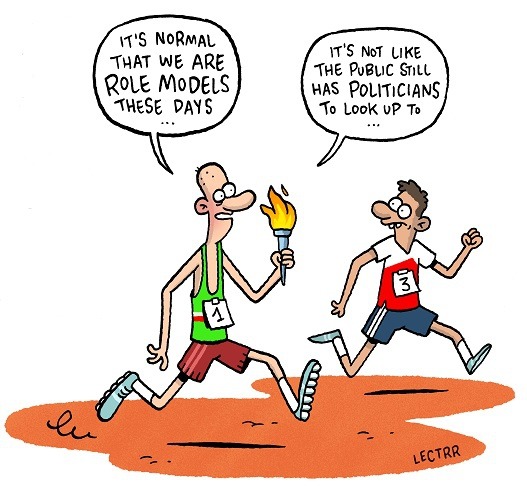I am as interested in sports as fish are in gardening. However, it is difficult to maintain an attitude of blissful indifference to the Olympics. The performances of countless top class athletes, who seek to capitalize on four years of practice and preparation, are permeated with an air of heroism and provoke a wide range of emotions among spectators and viewers: anticipation, nervousness, disillusionment and euphoria. In particular, the successes of our compatriots, Van Avermaet, Thiam, Timmers and others, leave little room for apathy. Why?
There are probably many answers to this question. Feelings of patriotism and solidarity with the society one belongs to probably play a role in awakening our enthusiasm for the efforts of others. After all, the sparkling successes of compatriots also reflect on us, the society in which they got to maximize their talents. The need for escapism probably also plays an important role: we must be able to switch off our thoughts once in a while, to be distracted from the daily slog of our ordinary lives. The Olympics are perfectly suited for that. We need divertissement, as the French philosopher Blaise Pascal said. We need distraction, in order to get focused again. That is why distractions are attractions, and why television and the extraordinary efforts of athletes are a welcome source of divertissement to many.
Role Models
Another possible explanation of why we easily get carried away by the heroism in Rio might be found in the fact that we have a hunger for role models. We need people we can look up to. According to the German philosopher Max Scheler, role models – or model persons, as he also calls them – are of the utmost importance to human progress: not only because of what they do themselves, but also because of what they have others do. Scheler, who is probably one of the most underestimated philosophers of the 20th century, developed a theory of values and model persons.
Embodied values
Values, real as they are, are abstract and intangible. You cannot “see” the values of beauty, goodness, vitality, justice; what you perceive is the realization of these values in actual objects and their embodiment in the people who achieve them. What motivates people in the pursuit of values is not so much abstract values in themselves, but their embodiment in real persons. The value of beauty is personified in model persons like Beethoven and Mozart, and that is why we can find them so inspiring. A transcendental goodness is embodied by religious role models (Scheler mentions in particular Jesus and Buddha), and whereas it is difficult to be inspired by the idea of transcendental goodness in itself, the creed “follow his example” doesn’t require elaborate metaphysical analysis or knowledge of the ontology of values. It is much easier to understand this simple creed and to be motivated by it: just do as your role models do. Similarly, “heroes” embody vitality and power – heroes like the athletes in Rio.
Idols
I think you can learn a great deal about a society on the basis of its role models. A society where hedonism prevails is likely to put people whose main business is in generating pleasure and happiness on a pedestal: entertainers, pop stars and Hollywood celebrities for example. That we idolize them says more about us, as a society, than about them as individuals.
Sports and arts
If you can indeed tell something about a society on the basis of its role models, it seems fair to claim that in our society we value vitality more than beauty. Sports are more important to us than arts. We idolize great sportsmen, and hardly know the names of the great artists of today. You can be a fairly mediocre soccer player and still be famous all across the globe, but if you ask people who Alexander Stoddart is – arguably the greatest sculptor of our era – they are likely to have no idea whatsoever.
Success in sports generates much more enthusiasm and interest than the efforts of world-class artists in international contests. We don’t hang out our national flags when a compatriot performs well in the International Chopin Piano Competition. We don’t put mirror flags on our cars when a fellow countryman becomes the director of Tate Modern, has an exhibition in MoMA or wins the Nobel Prize. And we certainly don’t collect Panini stickers of poets or composers. The idea itself would indeed seem ludicrous. But then again you could wonder: why should that be ridiculous? Is it because we value vitality so much more than beauty and prefer our role models to be athletes rather than artists?
Physical effort
There is of course sometimes beauty in vitality, and also, and this is often forgotten, much vitality in art. Mastering an art is not only an intellectual or spiritual endeavour. It often requires immense physical effort and devotion as well. In a world where vitality is perhaps over glorified, there is still hope for the great artists of today to become more revered role models. And in the unlikely event that there will be a Panini album of the competitors at the next Queen Elisabeth Competition, my children will be among the first to begin collecting stickers.
By Alicja Gescinska


